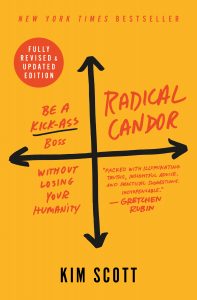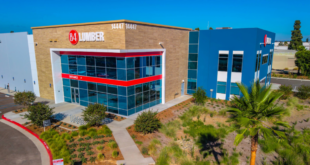Giving employees feedback about their job performance can be tricky waters to navigate for the inexperienced manager. Done correctly, kind and clear criticism can lead to growth and development. Mishandled, critical feedback can be a bad experience that divides a work relationship.
“Radical Candor” is a New York Times Bestseller by Kim Scott that helps managers rethink the way they give and receive feedback. It focuses on the importance of building more trusting relationships by caring personally about the people you work with while being willing to challenge them directly and push them to keep improving. Done in this way, feedback becomes a conversation built on a trusting relationship.
 Amy Sandler is the chief content officer at Radical Candor, an executive education company based on Scott’s book. She shared some best practices with Hardware Retailing on giving effective feedback.
Amy Sandler is the chief content officer at Radical Candor, an executive education company based on Scott’s book. She shared some best practices with Hardware Retailing on giving effective feedback.
“The idea of Radical Candor challenges people to do more of what was good, so they can build on their success and help others learn from it as well and do less of what’s not working well,” she says. “It shows you care because it shows you are noticing and that you want to help the person and the team achieve their goals.”
Give Feedback Often
Instead of giving a formula or schedule for giving feedback, Sandler says you should do it as often as needed.
“Give feedback early and often. The atomic building block of being radically candid is the two-minute impromptu feedback conversation,” she says.
“Radical Candor” author and co-founder Scott says, “Impromptu feedback is something you can squeeze in between meetings in two minutes or less. The best feedback (both praise and criticism) I’ve gotten in my life generally happened in super-quick conversations between meetings or standing waiting for a light to change. Getting and giving impromptu feedback is more like brushing and flossing than getting a root canal. Don’t schedule it. Just ask for it and offer it consistently and immediately when it’s needed, and maybe you won’t ever have to get a root canal.”
Give and Receive
Practicing the “radical candor” as described in the book starts with getting feedback before giving it. Then you need to gauge your feedback to see how the other person is receiving it. Finally, when you encourage feedback, you’re showing others it’s something everyone needs.
“Solicit feedback before giving it. When you’re giving feedback, include both praise and criticism, but focus on the good stuff,” Sandler says. “Then you need to gauge your feedback by asking how your feedback is landing for the other person. When someone is radically candid, the effects are measured not at the speaker’s mouth but at the listener’s ear. Finally, encourage feedback. We can all lead by example.”
Managers who ask for and receive feedback with curiosity support their own leadership development and have a better understanding of what’s really on their team members’ minds. They also help create a safe environment for employees who may feel vulnerable.
“When it comes to giving feedback—especially criticism—it’s important to show that we can take it before we start dishing it out, especially if we’re managers. We need to lay our power down,” she says.
Be Specific
Avoid what Scott calls Ruinous Empathy, where you skirt the issue by being vague and indirect, or just not saying anything, so as not to hurt anyone’s feelings.
“Remember that Radical Candor is a practice; start where you are, and give yourself—and each other—permission to make mistakes,” Sandler says. “Start by asking for feedback and sharing why Radical Candor is important to you. And be sure to look for areas where you can give your colleagues specific and sincere praise. Radically Candid praise is a fast and effective way to build relationships, identify strengths and show the team what success looks like.”
Lead by Example
Feedback is a two-way street.
“Lead by example and show some vulnerability. Your personal stories will explain, better than any management theory, what you really mean and show why you really mean it. That’s why Kim Scott tells all those personal stories in “Radical Candor.” Your stories will mean a lot more to your team than other people’s stories do because they mean something to you,” Sandler says.
Listen to what employees are telling you, even if you disagree. When you do disagree, make sure you clearly understand what they were telling you, and then find a time to explain your viewpoint.
“Replace blame with curiosity and listen with the intent to understand versus to respond,” she says.
Be Honest, Not Brutal
Scott draws a distinction between kind and clear criticism and brutal honesty, or Obnoxious Aggression. It’s one of four ways people can give each other feedback, three of which miss the mark.
“Radical Candor is kind and helpful,” she says. “Obnoxious Aggression, on the other hand, is mean, when you are challenging directly without showing you care personally. It’s also called brutal honesty or front stabbing. Ruinous Empathy is when we’re being nice, but it’s ultimately unhelpful or even damaging. Manipulative Insincerity is like a stab in the back. It’s talking about people instead of talking to them.”
Finally, “Use the Radical Candor framework like a compass to guide your conversations to a better place,” Sandler notes. “It’s not a personality test; these are mistakes we all make.”
 Hardware Retailing The Industry's Source for Insights and Information
Hardware Retailing The Industry's Source for Insights and Information






